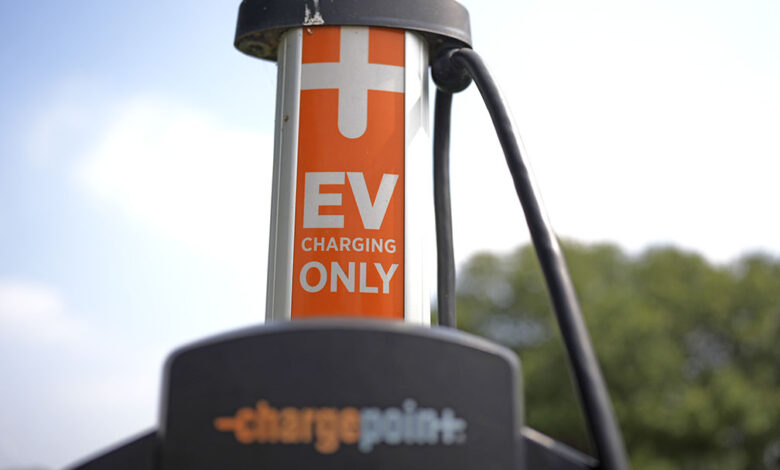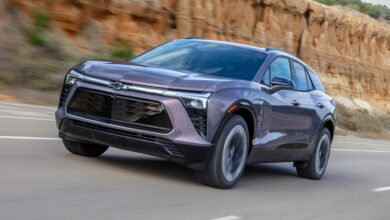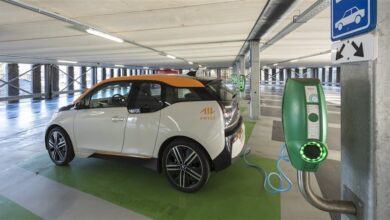Many Americans are still shying away from EVs despite Biden’s push

WASHINGTON — Many Americans still aren’t sold on going electric for their next car purchase. High prices and a lack of easy-to-find charging stations are major sticking points, a new poll shows.
It’s much the same in the trucking industry, as electric rigs are mostly being used for drayage and short-haul routes due to their limited ranges and a lack of charging infrastruture.
About 4 in 10 U.S. adults say they would be at least somewhat likely to buy an electric vehicle (EV) the next time they buy a car, according to the poll by The Associated Press-NORC Center for Public Affairs Research and the Energy Policy Institute at the University of Chicago, while 46% say they are not too likely or not at all likely to purchase one.
The poll results, which echo an AP-NORC poll from last year, show that President Joe Biden’s election-year plan to dramatically raise EV sales is running into resistance from American drivers. Only 13% of U.S. adults say they or someone in their household owns or leases a gas-hybrid car, and just 9% own or lease an electric vehicle.
A new rule from the Environmental Protection Agency requires that about 56% of all new vehicle sales be electric by 2032, along with at least 13% plug-in hybrids or other partially electric cars. Auto companies are investing billions in factories and battery technology in an effort to speed up the switch to EVs to cut pollution, fight climate change — and meet the deadline.
EVs are a key part of Biden’s climate agenda. Republicans led by presumptive nominee Donald Trump are turning it into a campaign issue.
Younger people are more open to eventually purchasing an EV than older adults. More than half of those under 45 say they are at least “somewhat” likely to consider an EV purchase. About 32% of those over 45 are somewhat likely to buy an EV, the poll shows.
But only 21% of U.S. adults say they are “very” or “extremely” likely to buy an EV for their next car, according to the poll, and 21% call it somewhat likely. Worries about cost are widespread, as are other practical concerns.
Range anxiety — the idea that EVs cannot go far enough on a single charge and may leave a driver stranded — continues to be a major reason why many Americans do not purchase electric vehicles.
About half of U.S. adults cite worries about range as a major reason not to buy an EV. About 4 in 10 say a major strike against EVs is that they take too long to charge or they don’t know of any public charging stations nearby.
Concern about range is leading some to consider gas-engine hybrids, which allow driving even when the battery runs out. Jud, a 33-year-old operations specialist and political independent, said a hybrid “is more than enough for my about-town shopping, dropping my son off at school” and other uses.
With EV prices declining, cost would not be a factor, Jud said — a minority view among those polled. Nearly 6 in 10 adults cite cost as a major reason why they would not purchase an EV.
Price is a bigger concern among older adults.
The average price for a new EV was $52,314 in February, according to Kelley Blue Book. That’s down by 12.8% from a year earlier, but still higher than the average price for all new vehicles of $47,244, the report said.
About half of those who say they live in rural areas cite lack of charging infrastructure as a major factor in not buying an EV, compared with 4 in 10 of those living in urban communities.
The AP-NORC poll of 6,265 adults was conducted March 26 to April 10, 2024 using a combined sample of interviews from NORC’s probability-based AmeriSpeak Panel, which is designed to be representative of the U.S. population, and interviews from opt-in online panels. The margin of sampling error for all respondents is plus or minus 1.7 percentage points. The AmeriSpeak panel is recruited randomly using address-based sampling methods, and respondents later were interviewed online or by phone.
The Associated Press is an independent global news organization dedicated to factual reporting. Founded in 1846, AP today remains the most trusted source of fast, accurate, unbiased news in all formats and the essential provider of the technology and services vital to the news business. The Trucker Media Group is subscriber of The Associated Press has been granted the license to use this content on TheTrucker.com and The Trucker newspaper in accordance with its Content License Agreement with The Associated Press.



